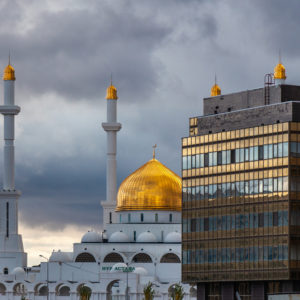One of the great challenges for countries seeking global investment is to be able to assure that their legal systems are transparent, reliable, and free from political influence.
Kazakhstan, an ambitious Central Asian country, has risen to this challenge with the Astana International Financial Center (AIFC).
Established in July 2018, the AIFC, based in Kazakhstan’s capital Nur-Sultan, imported a gold-plated, civil legal system for litigation and dispute resolution. It installed English law, which is the preferred governing law for business transactions worldwide.
These courts may sit in the capital Nur-Sultan, previously named Astana, but they were established entirely under the administration of Lord Harry Woolf, the retired chief justice of England and Wales. The courts are now directed by its Chief Justice Lord Jonathan Mance, former deputy president of the Supreme Court in the United Kingdom, and 10 other English judges. This is a big step forward for an ex-Soviet republic where the USSR used to send millions of political prisoners to some of the more notorious Gulag camps.
Kazakhstan has embraced English law as a source of reliable and reputable jurisprudence for its financial center and enshrined its applicability in a constitutional amendment. The court has also embraced English as the only language to be used by it. Elsewhere in Kazakhstan, Kazakh and Russian are the official languages.
In conceiving the idea of a financial center, the country wanted to make it user-friendly and to attract investment from neighbors China, Russia, the Caucasus, Uzbekistan, Iran, Turkey, and further afield from Europe, the Middle East, Singapore, and the United States. It wants the neighborhood business and that of the world.
The strategy is working. AIFC has attracted 750 firms from 53 countries, and its recently established stock exchange has had 61 issues.
Kazakh officials tell me that they wish to play on the country’s unique location as a traditional crossroads of Europe and Asia. Kazakhstan is the ninth-largest country in the world but has a population of about 18 million. It is landlocked, lying right on the path of the ancient Silk Road and the modern Chinese Belt and Road initiative.
The AIFC is a building block in Kazakhstan’s aspiration to be one of the world’s leading nations by 2050. It offers investors a tax holiday – from corporate taxes for the income received from providing financial and other services, as well as from capital gains — until 2066.
Kazakhstan is located in a potentially turbulent area bordering Russia, China, Kyrgyzstan, Uzbekistan, and Turkmenistan, and lying close to Turkey and Iran. But that also is an asset when seeking to build a financial center. These are the very neighbors who seek financial services.
An additional strength for the AIFC is it has a substantial stake in the world of Muslim finance. This requires a separate set of skills and practices and the AIFC has them. Trillions of dollars are involved.
Kazakhstan is constitutionally secular. Islam is the majority religion of Kazakhstan and practiced in moderation. Other religions are experiencing freedom of worship. I know this from having interviewed both the chief rabbi and the Roman Catholic archbishop a few years ago.
Financial centers appeal to global money managers for various reasons. That may be because of currency advantages, tax favorability, low political risk, sanctions avoidance, and new direct investment opportunities.
Transparent, predictable, and effective dispute resolution is one of the main points of attraction as Hong Kong (in the past), Singapore, and, of course, London and The Hague have demonstrated.
The AIFC is also playing a key role in promoting foreign investment in Kazakhstan, according to Kairat Kelimbetov, AIFC governor and chairman of the Agency for Strategic Planning and Reforms. He is a veteran senior economic policymaker in the country.
Kazakhstan’s thrust to be a major player in international finance comes at a time of realignment, with the traditional financial centers of New York, London, Frankfurt, and Hong Kong surrendering to new international realities, like Brexit and Western sanctions on Russia and Iran.
Since independence in 1991, Kazakhstan has relied on its extensive oil and gas fields in the Caspian Sea region for its prominence and wealth. However, like many fossil fuel-rich countries, it is hedging against a declining role for hydrocarbons in the future and is pushing financing, green energy, and new technologies. Kazakhstan, sitting astride the Eurasian Steppe, has one of the world’s greatest wind resources.
And English law is bringing the winds of fortune to Kazakhstan.

